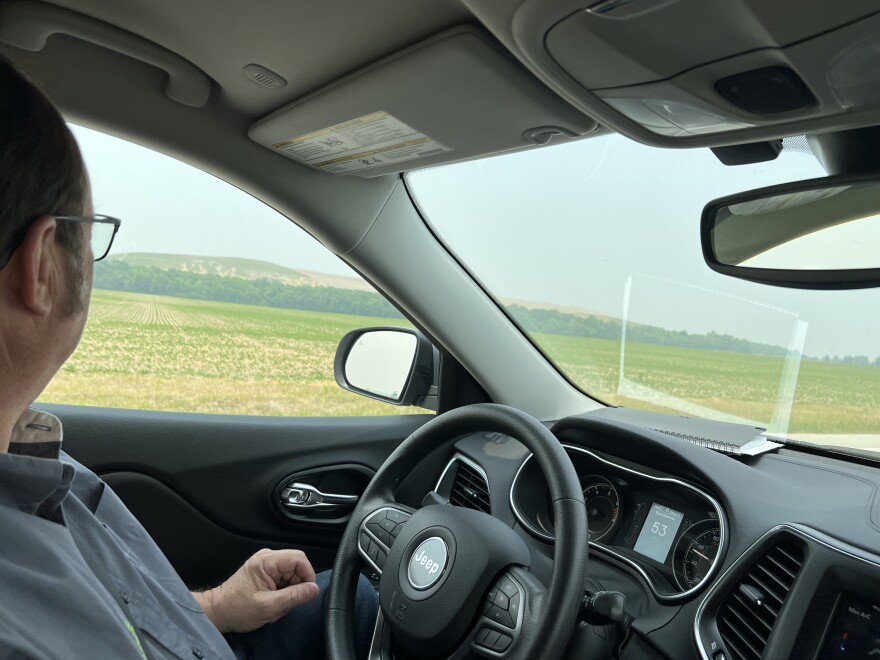On the surface, the view from Ashley Stahl’s home outside of Fostoria in Seneca County might seem serene. Tall hills stretch across the horizon and peek above the miles of flat farmland that span the northern Ohio county.
But, these hills are not made up of dirt. It's a mountainous pile of debris and solid waste. Stahl’s view is of Sunny Farms Landfill, one of the largest landfills in the state.
Around five years ago, Stahl says a rotten egg odor began to pervade the area, and her water started to stain her laundry. Local testing showed slightly higher than average levels of sulfate in the water.
“It does make it feel like this isn’t where we belong,” Stahl said. “We didn’t ask for this life.”
The trash mountain by Stahl’s home isn’t just discarded wrappers from her neighbors. It’s waste from New York, Connecticut and New Jersey.

Ohio imports a lot of trash. In 2022, about a third of the waste disposed here wasn’t produced by Ohioans. More than 7 million tons of it came in by rail from east coast states. Some state lawmakers are trying to give power over that waste back to the communities that receive it.
Residents worry over safety
The rotten egg odor in Fostoria has since gone away, after the state issued a consent decree for extra supervision of the landfill in 2019.
But fears still linger over air and water quality in the area. Some residents have considered leaving their homes due to the overwhelming odors. Stahl said she’s still afraid to have her kids use the water in their home.
“I have mom guilt. You just want your kids to just be kids and not have to worry about being scared of the water,” Stahl said. “It just makes it heavy on my heart.”
WIN Waste Innovations acquired Sunny Farms Landfill in 2019. Ben Nutter, community engagement manager at the landfill, said the new management has addressed all safety concerns, and the landfill is in full compliance with the Ohio Environmental Protection Agency.
“We're a business that has a significant economic impact in Seneca County, and Ohio, and we're operating well within accordance of the law. We're protecting the environment every day … We should be allowed to operate,” Nutter said in an interview with the Ohio Newsroom last June.
A ‘dumping ground’ for the East Coast
Sunny Farms Landfill is one of the largest landfills in Ohio, bringing in more than 6,000 tons of trash every day. Around 98% of that waste comes from out-of-state, according to Nutter.
Senator Bill Reineke, R-Tiffin, said he feels that’s wrong.
“I don't want Ohio to become the dumping ground for New York and the East Coast,” Reineke said.

Reineke believes Ohio charges too little to dispose of trash. Unlike many other states, he said Ohio has a special and cheaper designation for trash from construction sites. He said it’s “a deal” to dump in Ohio – one that makes Ohio’s small towns vulnerable.
“The landfills are in rural America,” Reineke said. “As flat as Ohio is, now we have mountains of trash, it becomes obvious to constituents and then, obviously, they're concerned about water and their sense of smell.”
The proposed bill
Reineke’s solution is to give counties the option to tax the intake of construction and demolition debris. SB119 wouldn’t ‘take out the trash’ per se, but it could help communities generate money to better oversee local private landfills, like Sunny Farms.
Nutter, with WIN Waste Innovations, said raising these fees aren’t necessary and will only harm Ohio’s taxpayers. He said the company already works with local health officials to test the air and water and ensure it’s safe. Plus, they’ve rolled out new technology to reduce emissions and they're already under increased scrutiny because of past violations.
“WIN Waste Innovations has nothing to hide, and we know we're protective of human health and the environment,” Nutter said.
But, Reineke said the measure is vital in ensuring local governments don’t feel powerless in holding private landfills accountable.
“It's where these people live. It's our health. It's our future,” Reineke said.
Moving the money
Right now, Ohio law lumps Seneca County with two other counties nearby, Ottawa and Sandusky. All three have to make joint decisions on what to do with their trash revenue. Only a small slice – around 3% – of the revenue goes to the local health department for landfill oversight.
But Seneca County is the only one taking in out-of-state trash and bringing in more than 80% of the revenue. That frustrates county commissioner Bill Frankart.
“We feel that they might not understand the issues that we have with our landfill, and the fees that come in get spread out with the other two counties,” Frankart.

The new bill would allow Seneca, and counties like it that generate more than 75% of the total solid waste revenue, to make their own decisions on how to spend the trash money.
He hopes it can be used to mitigate the impact on people like Ashley Stahl, who live next to one of the biggest landfills in the state.
“We want to help our health department to retrieve funds to be able to do more air monitoring, water monitoring, and also maybe have somebody there all the time when they're unloading to see what's coming into our landfill,” Frankart said.
The bill has passed in the Senate, but has stalled in committee in the House. Frankart wants to see it taken up soon, as Sunny Farms Landfill is proposing to expand. The landfill would be able to take in 4,500 more tons of trash a day.
Frankart said the bill is important to protect not just his community, but for small towns across the state. Under current law, he said every Ohio community is potentially vulnerable.
“It might not be their problem today,” Frankart said. “But tomorrow, it might be.”


